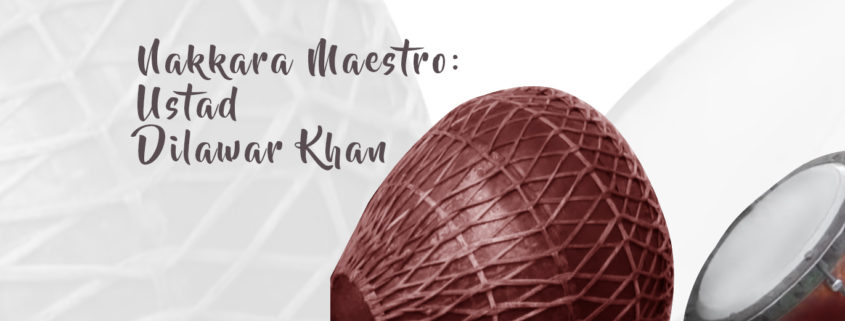
Great Nakkārā Player – Ustād Dilāwar Khān
One day, I received a phone call from some friends in Jaipur. A nakkārā player, Ustād Dilāwar Khān, was coming to Ahmedābād. (At the time, I did not know it, but he is one of the greatest nakkārā players in the world. I highly recommend that you listen to him.)
The Tablā has many influences and origins. The nakkārā (picture below) has a very strong influence on Tablā. It is two drums that are played with sticks. They are not widely played as an instrument. It is typically just played with the Śehnāi (Shehnaai). It is also rare to find nakkārā soloists of this caliber. Before hearing him, I had never heard the nakkārā played with such virtuosity.
The program was held in an old haveli (villa/ mansion). Almost all the good musicians of the city had congregated to hear the Ustād play. Before going to the program, I did not know what to expect, but my Jaipur friend had been adamant that this was not to be missed. I went to the program with a student of mine, Nitin Tripārti. As I watched him tune his instrument, I could anticipate the caliber of his playing.
His solo blew me away. He played all the complex compositions of the Tablā using sticks on the nakkārā . His solo was set in Tīntal. Similar to a Tablā solo, he began with a peśkār. He produced amazing mīnḍ using thin sticks. You could see his sādhanā in his playing. The speed of his kāidās and clarity of his relās. It was a Tablā solo, but with sticks. It’s difficult, but try to imagine Tirakiṭ compositions played with sticks. He played La killa (naga naga naga) with tremendous speed and power on one drum.
Everyone in the audience was amazed. Dilāwarsāheb took farmāiś from the audience. Panḍit Kishen Māhārāj was present and requested to hear a laggi. The way he played Dha Te Na Da laggi, with amazing speed and fluidity! The concert was truly a treat for musicians, especially for Tablā players.
I had always heard that Tablā, came from the nakkārā. That evening, I could clearly see and hear the relationship between the two.
After that solo, I never heard or saw Dilāwar Khānsāheb again. I searched for other nakkārā players, but never came across anyone who could play his level of playing and mastery. That evening was one of those rare concerts in my life, and even though there was no recording, I can hear it as clearly as I did nearly 30 years ago.

